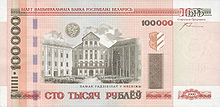- Ruble
-
 5000 Russian rubles issued in 2006
5000 Russian rubles issued in 2006
 100,000 Belarusian rubles issued in 2005
100,000 Belarusian rubles issued in 2005
 1 Transnistrian ruble issued in 2000
1 Transnistrian ruble issued in 2000
The ruble or rouble[pronunciation?] (Russian: ру́бль, IPA: [ˈrublʲ]) is a unit of currency. Currently, the currency units of Belarus, Russia, Abkhazia, South Ossetia and Transnistria, and, in the past, the currency units of several other countries, notably countries influenced by Russia and the Soviet Union, are named rubles, though they all are different currencies. One ruble is divided into 100 kopecks (Russian: копе́йка, kopeyka), a name also used for the one-hundredth part of a Ukrainian hryvnia.
Contents
Etymology
Origin
According to one version, the word "ruble" is derived from the Russian verb рубить, rubit, i.e., to cut, to chop, to hack.
In Russian:
Рубли были частями гривны или кусками серебра с зарубками, означавшими их вес. Каждая гривна разделялась на четыре части; название же рубль произошло от слова «рубить», потому что прут серебра в гривну весом разрубался на четыре части, которые и назывались рублями.
Rubles were parts of the hryvnia or pieces of silver with notches indicating their weight. Each hryvnia was divided into four parts; the name "ruble" came from the word "cut" because the silver rod weighing 1 grivna was split into four parts, which were called rubles.[1]Historically, "ruble" was a piece of a certain weight chopped off a silver ingot (grivna), hence the name. Another version of the word's origin is it comes from the Russian noun рубец, rubets, i.e., the seam that is left around the coin after casting: silver was added to the cast in two steps. Therefore, the word ruble means "a cast with a seam".[2]
The ruble was the Russian equivalent of the mark, a measurement of weight for silver and gold used in medieval western Europe. The weight of one ruble was equal to the weight of one grivna.
In Russian, a folk name for "ruble", tselkovyj (целковый, wholesome), is known, which is a shortening of the целковый рубль ("tselkovyj ruble"), i.e., a wholesome, uncut ruble.[citation needed]
The word kopek, kopeck, copeck, or kopeyka (in Russian: копейка, kopeyka) derives from the Russian kop'yo (копьё) — a spear. The first kopek coins, minted at Novgorod and Pskov from about 1535 onwards, show a horseman with a spear. From the 1540s onwards the horseman bears a crown, and doubtless the intention was to represent Ivan the Terrible, who was Grand Prince of all Russia until 1547, and Tsar thereafter. Subsequent mintings of the coin, starting in the 18th century, bear instead Saint George striking down a serpent.
In 1704, Russia was the first country in the world to introduce a decimal monetary system, where one ruble was equal to 100 kopeks.
English spelling
Both the spellings "ruble" and "rouble" are used in English. The form "rouble" is preferred by the Oxford English Dictionary, but the earliest use recorded in English is the now completely obsolete "robble". The form "rouble" probably derives from the transliteration into French used among the Tsarist aristocracy. There is some tendency for North American authors to use "ruble" and other English speakers to use "rouble", and also some tendency for older sources to use "rouble" and more recent ones to use "ruble", but neither tendency is absolute.
Plurals in Russian
The Russian plurals that may be seen on the actual currency are modified according to Russian grammar. Numbers 1, 21, 31 etc. are followed by nominative singular рубль, копейка. Numbers 2-4, 22-24, 32-34 etc. will be followed by genitive singular рубля, копейки. Numbers 5-20, 25-30, 35-40 etc. will be followed by genitive plural рублей, копеек.
Other languages
See also: Soviet rubleIn several languages spoken in Russia and the former Soviet Union, the currency name has no etymological relation with ruble. Especially in Turkic languages or languages influenced by them, the ruble is often known (also officially) as som or sum (meaning pure), or manat (from Russian moneta, meaning coin).
Soviet banknotes had their value printed in the languages of 15 republics of the Soviet Union.
List of rubles
Current
Obsolete
(This list may not contain all historical rubles, especially rubles issued by sub-national entities)
- Armenian ruble
- Azerbaijani ruble (ruble is the Russian name of the first Azerbaijani manat)
- Georgian ruble (ruble is the Russian name of the Georgian maneti)
- Latvian rublis
- Soviet ruble
- Tajikistani ruble
- Transcaucasian ruble
- Ukrainian ruble (in the Soviet Union ruble was the Russian name of the Ukrainian karbovanets)
- Tuvan akşa and kɵpejek
References
- ^ Кондратьев И. К. Седая старина Москвы. М., 1893.
- ^ Sergey Khalatov. History of Ruble and Kopek on "Collectors' Portal UUU.RU" (Russian)
Categories:- Modern obsolete currencies
- Currency
- Currencies of Russia
- Numismatics
- Russian loanwords
Wikimedia Foundation. 2010.
